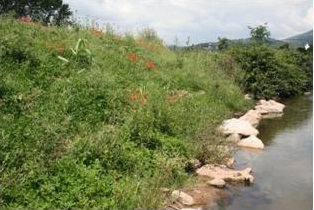Case study:River restoration project in Congost between the torrent of Malhivern and end of the municipality of La Garriga: Difference between revisions
No edit summary |
No edit summary |
||
| (One intermediate revision by one other user not shown) | |||
| Line 1: | Line 1: | ||
{{ | {{Case study status | ||
|Approval status= | |Approval status=Approved | ||
}} | }} | ||
{{Location | {{Location | ||
| Line 222: | Line 217: | ||
}} | }} | ||
{{Measures | {{Measures | ||
|Bank and bed modifications measure= | |Bank and bed modifications measure=New bioengineering elements in order to stabilize slope banks,Removal of rip-rap | ||
|Floodplain / River corridor=Removal of exotic plants | |||
|Floodplain / River corridor= | |||
}} | }} | ||
{{Hydromorphological_quality_elements_header}} | {{Hydromorphological_quality_elements_header}} | ||
Latest revision as of 09:15, 5 June 2017
Project overview
| Status | Complete |
|---|---|
| Project web site | |
| Themes | Habitat and biodiversity, Water quality |
| Country | Spain |
| Main contact forename | Naturalea S.L. |
| Main contact surname | Naturalea S.L. |
| Main contact user ID | |
| Contact organisation | Naturalea S.L. |
| Contact organisation web site | |
| Partner organisations | |
| Parent multi-site project | |
| This is a parent project encompassing the following projects |
No |
Project summary
The restored section has a length of 650m, a common channel between 4 and 6 m and a width of 35m in ordinary floods. The slope of the river terrace is bound by dikes and embankments in some places not stabilized in others and longitudinal continuity of the river influenced by two rip-raps. There are occupations of the river area for industrial activities and eventually discharges of debris. As relevant to vegetation, effects of overgrazing are detected and a significant proliferation of exotic species.
The main objectives of this project are: limit the presence and possible expansion of invasive exotic species of vascular plants; removal of non-functional riprap stretches the right margin; increase morphological heterogeneity in the right margin; promote the recovery of native riparian vegetation; minimize the impact of human activities taking place in the fluvial environment and are likely to maintain or produce impacts; improving the landscape and the river ecosystem.
The project has a total budget of 155.568,08 € and is financed by the Consorci of Besós.
Monitoring surveys and results
Lessons learnt
Image gallery
|
Catchment and subcatchmentSelect a catchment/subcatchment
Catchment
Subcatchment
Site
Project background
Cost for project phases
Reasons for river restoration
Measures
MonitoringHydromorphological quality elements
Biological quality elements
Physico-chemical quality elements
Any other monitoring, e.g. social, economic
Monitoring documents
Additional documents and videos
Additional links and references
Supplementary InformationEdit Supplementary Information
| ||||||||||||||||||||||||||||||||||||||||||||||||||||||||||||||||||||||||||||||||||||||||||||||||||||||||||||||||||||||||||||||||||||||||||||||||||||||||||||||||||||||||||||||||||||||||||||||||||||||||














